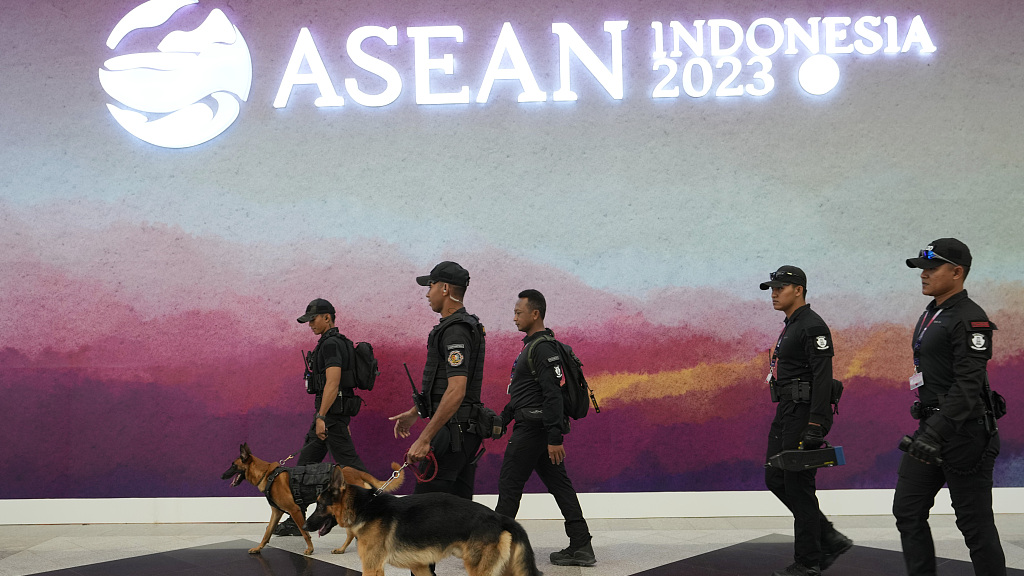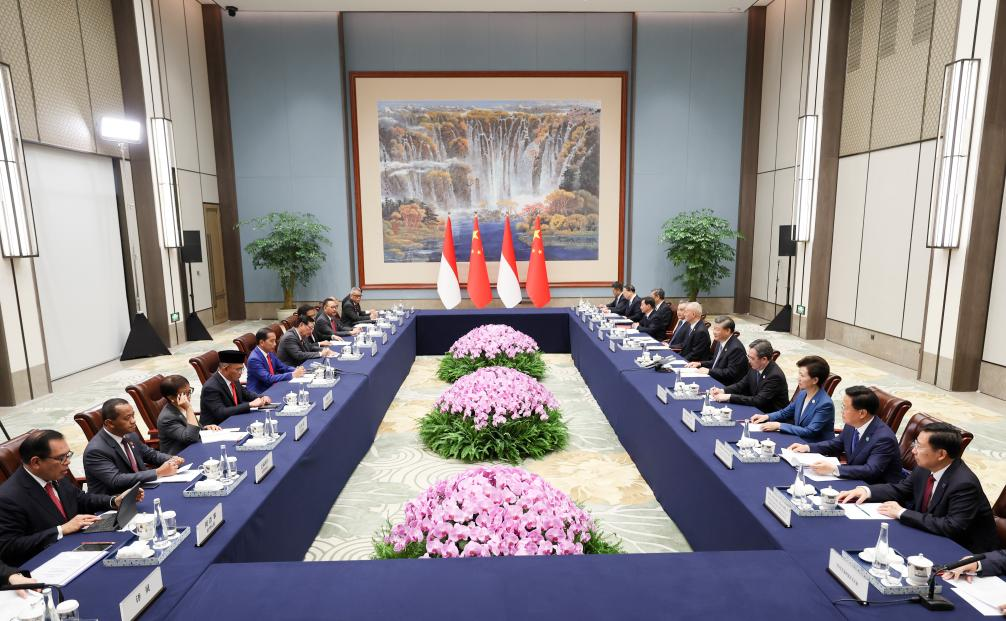
Members of Presidential Guards patrol outside the venue of the ASEAN Summit in Jakarta, Indonesia, September 4, 2023. /CFP
Members of Presidential Guards patrol outside the venue of the ASEAN Summit in Jakarta, Indonesia, September 4, 2023. /CFP
Editor's note: Hannan Hussain, a special commentator on current affairs for CGTN, is a writer and assistant research associate at the Islamabad Policy Research Institute. The article reflects the author's opinions and not necessarily the views of CGTN.
On September 5, Chinese Premier Li Qiang will begin his official visit to Indonesia, where he will attend the 26th China-ASEAN Summit, the 26th ASEAN Plus Three Summit and the 18th East Asia Summit. Li is also set to advance China's support for this year's leaders' meetings on East Asia cooperation, held under the theme of "ASEAN Matters: Epicentrum of Growth."
As the first visit to Indonesia by a Chinese premier in five years, Li's trip sends a profound message on wide-ranging cooperation priorities. His participation at the meetings is likely to bolster ASEAN and China's robust consensus on economic and trade cooperation, which has served as the linchpin of their comprehensive strategic partnership, and stronger coordination in emerging sectors can further boost common development.
Statistics from China's Ministry of Commerce indicate that bilateral trade volume worth $975.3 billion in 2022, an expansion of 1.2-fold over a decade. Some of the key fields of collaboration at this year's ASEAN summit include digital and green economies, two areas that formed a detailed consensus with Beijing at last year's China-ASEAN Summit.
Through shared support for an open and inclusive regional cooperation architecture, both ASEAN and China are also well-positioned to strengthen multilateralism amid global economic pressures. Efforts are already underway to accelerate the negotiation of version 3.0 of the China-ASEAN Free Trade Zone.
Similarly, ASEAN and China are a central part of the 15-member Regional Comprehensive Economic Partnership (RCEP), which enabled nearly 65 percent of tariff-free trade in goods among all RCEP states. Li's visit can build on that momentum and deliver more win-win opportunities in high-growth sectors and commodities to the benefit of a shared community.
One of the hallmarks of China-ASEAN relations is their consistent adherence to the principle of non-interference and continued championship of a stable and peaceful regional security environment. The China-ASEAN Summit itself is a significant platform to underscore priorities. It has helped accelerate understanding of the South China Sea Code of Conduct, protected ASEAN-China cooperation from the perils of external interference, and illuminated new growth points for trade and investment.
Li's attendance at the meetings will inject new momentum into consensus-based diplomacy on regional issues. "We hope the meetings will promote solidarity, deepen cooperation, focus on development, and inject more stability and positive energy into the international and regional landscape," said Chinese Foreign Ministry Spokesperson Wang Wenbin at a recent press conference.
On the bilateral front, China-Indonesia relations have truly come a long way. Li's visit to Jakarta comes on the occasion of the 10th anniversary of the establishment of the China-Indonesia comprehensive strategic partnership. Talks are likely to deepen strategic mutual trust after Indonesian President Joko Widodo's highly successful visit to China in July. Jakarta is one of China's chief partners under the Belt and Road Initiative, which has furthered development synergies between Indonesia's vision of the Global Maritime Fulcrum and the China-led initiative.

Chinese President Xi Jinping meets with Indonesian President Joko Widodo in Chengdu, capital city of southwest China's Sichuan Province, July 27, 2023. /Xinhua
Chinese President Xi Jinping meets with Indonesian President Joko Widodo in Chengdu, capital city of southwest China's Sichuan Province, July 27, 2023. /Xinhua
Li's visit should be seen as another major opening to advance long-term cooperation initiatives proposed by the heads of state in July. These included the initiation of a "2+2" dialogue mechanism for foreign and defense ministers and an increase in productive strategic communication exchanges.
By virtue of its chairmanship of ASEAN, Indonesia can also promote the strategic autonomy and solidarity of the group and expand the overall scope of economic and trade cooperation. China was the second-largest source of investment in Indonesia last year with $8.2 billion, just behind Singapore with $13.3 billion.
Thus understood, Li's visit to Indonesia – his first to an Asian country after assuming his post – underlines Jakarta's unique place in China's foreign policy and the value that Beijing confers upon even closer ASEAN-China ties.
(If you want to contribute and have specific expertise, please contact us at opinions@cgtn.com. Follow @thouse_opinions on Twitter to discover the latest commentaries in the CGTN Opinion Section.)